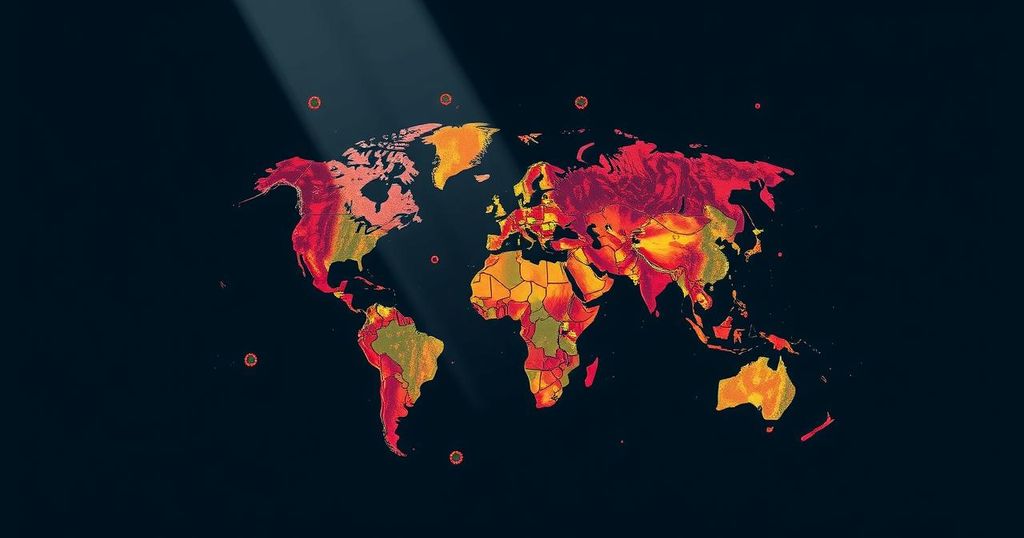Experts warn that climate change poses unprecedented threats to global human health, as revealed in a recent report that highlights record levels of danger, including increased fatalities from heat, the spread of infectious diseases, and food insecurity. While some positive strides have been made in reducing pollution and advancing renewable energy, significant action is necessary to combat the escalating health risks associated with climate change.
A recent report has revealed that climate change is severely impacting global human health in alarmingly unprecedented ways. Experts highlight that the toll of inaction regarding climate issues “has been paid in lives.” The report was released amid catastrophic weather events, including heatwaves, wildfires, hurricanes, droughts, and floods, which have plagued the planet during what is projected to be the hottest year recorded to date. This release coincides with impending United Nations Climate Change Conference negotiations in Azerbaijan and a critical U.S. election, raising concerns regarding the potential return of leaders skeptical of climate science. The eighth Lancet Countdown report, compiled by a team of 122 experts, including representatives from prominent UN bodies such as the World Health Organization, demonstrates a grim scenario characterized by numerous alarming health indicators. Over half of the monitored indicators over the past eight years have reached concerning new extremes. Notable increases include the rise in extreme weather occurrences, heat-related fatalities among the elderly, the escalation of infectious diseases, and food insecurity stemming from adverse climatic conditions disrupting agriculture. Marina Romanello, the executive director of the Lancet Countdown, reported to the Agence France-Presse that these findings signify record-level threats to public health across all nations, surpassing previously documented dangers. Since the 1990s, there has been a staggering 167 percent increase in heat-related deaths among individuals aged 65 and older. Additionally, warmer climates have expanded the habitats for mosquitoes and other disease vectors, resulting in over five million cases of dengue fever reported globally last year. The report also highlighted the alarming degradation of tree cover, with approximately five percent lost between 2016 and 2022, consequently diminishing the Earth’s capacity for carbon dioxide absorption. It illuminated the substantial role that oil and gas companies, along with governmental and banking entities, play in exacerbating climate change. Following consistent warnings, global greenhouse gas emissions surged again last year, contrary to the necessary course of action. Notably, fossil fuel companies, experiencing record profits, have intensified production amidst rising prices driven by geopolitical events, including Russia’s invasion of Ukraine. In 2022, fossil fuel subsidies reached an astonishing $1.4 trillion, drastically overshadowing financial commitments aimed at paving a transition to a sustainable future. However, amidst these troubling trends, Romanello cited some positive developments: deaths related to fossil fuel pollution experienced a decline of nearly seven percent from 2016 to 2021, attributable to enhanced regulation on coal emissions. Additionally, renewable energy sources have vastly increased their contribution to the electricity grid. This report emphasized that swift and decisive action is paramount to avert a perilous future, underscoring the urgency of the situation. “There is really no more time to waste… wasted time has been paid in lives,” Romanello asserted, advising individuals to adopt climate-friendly lifestyles, support environmentally conscious financial institutions, and advocate for policy-makers committed to addressing climate challenges.
The global health landscape is increasingly under threat from the effects of climate change, which exacerbates existing health issues and introduces new hazards. Major reports from reputable sources, such as the Lancet Countdown, provide vital insights into the interconnectedness of climate dynamics and public health, evidencing the urgency for comprehensive action. As extreme weather events become more frequent and pervasive, their repercussions including rising mortality rates, heightened disease transmission, and food insecurity demand immediate and strategic interventions on both national and global levels. The context of global climate negotiations and elections further complicates the landscape, presenting critical opportunities for progress or regression in climate action.
In conclusion, the latest report underscores the severe and escalating threats posed to human health by climate change, evidenced by alarming trends in extreme weather, disease prevalence, and environmental degradation. While action to mitigate these threats has seen some positive developments, the overall message is clear: urgent and sustained efforts are required to protect public health and the planet. There is a pressing need for both individual and systemic changes to combat climate risks effectively, as inaction continues to result in tragic losses.
Original Source: www.rfi.fr







